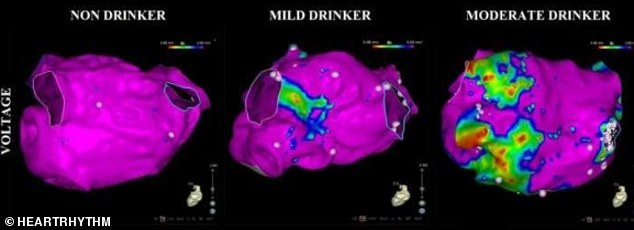
Shocking scans reveal how regular alcohol consumption can lead to an irregular heartbeat
Disturbing heart scans have revealed the damage regular drinking can inflict on the organ.
Evidence already exists to show that consuming too much alcohol boosts your risk of developing an irregular heartbeat.

The amount of booze someone drinks is an ‘important risk factor’ for atrial fibrillation – an irregular heartbeat, the Australian experts say.
The condition raises the risk of having a stroke or heart failure, meaning drinking habits could signpost future heart problems.
All of the 75 volunteers who had scans taken were known to have atrial fibrillation. They were split into three categories, depending on how much they drunk.
Electrical signals are vital to the function of the heart because, controlled by nodes linked to the nervous system, they tell it when to contract and relax.
A healthy heart needs the signals to flow freely and regularly through undamaged tissue.
Hearts which are scarred, from drinking and other unhealthy habits, are less able to conduct the signal and therefore more likely to be out of time.
The scans show a non-drinker’s heart as entirely pink, which represents healthy tissue through which full-strength electric signals can flow.
Whereas the heart of what the scientists called a ‘moderate drinker’ has large patches of scarring shown in green, where electrical signals are weaker.